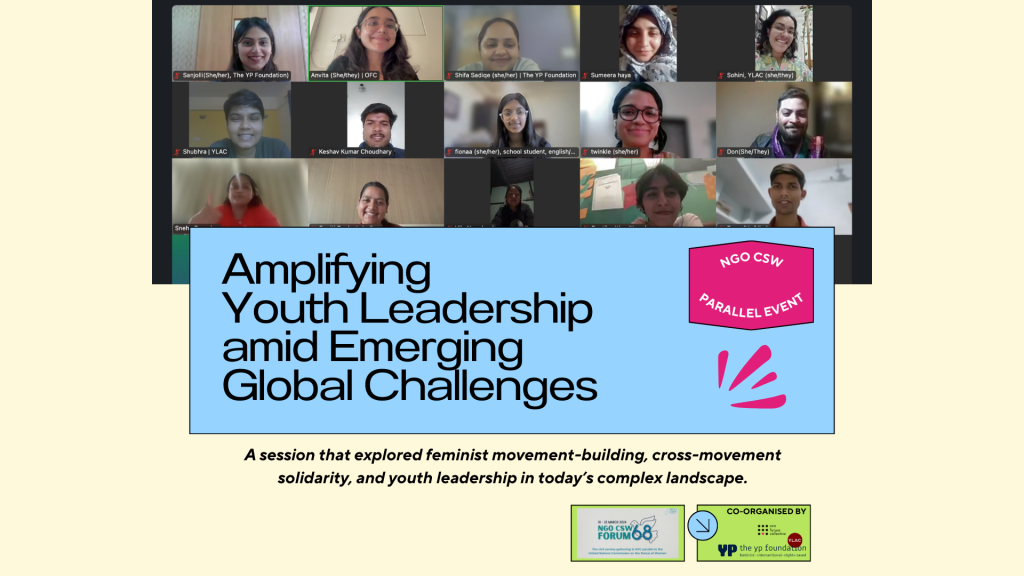In an era of deepening global crises where power is being contested in new and urgent ways, young feminist leaders are reimagining the future of gender justice. From the rise of anti-rights movements to the intersections of digital surveillance, escalating violence, climate change, and geopolitical tensions, the landscape of movement-building is evolving in ways that demand adaptive strategies, cross-movement solidarity, and more intentional leadership.
How do we sustain feminist movements in these times? What does it take to challenge entrenched power structures while building solidarity across movements? How can young feminists build movements that are intersectional, transformative, and future-facing?
These were some of the pressing questions at the heart of our Virtual Parallel Event—Amplifying Youth Leadership Amid Emerging Global Challenges—organized by One Future Collective, Young Leaders for Active Citizenship (YLAC), and The YP Foundation as part of the NGO CSW Virtual Parallel Events on March 12, 2025.
The Beijing+30 marked three decades since the adoption of the Beijing Declaration and Platform for Action (BPfA) at the Fourth World Conference on Women in 1995. As one of the most comprehensive global frameworks for gender equality, the BPfA continues to serve as a critical blueprint for advancing women’s rights. In 2025, the 69th session of the UN Commission on the Status of Women (CSW69) assessed both achievements and persistent challenges. NGO CSW, a key civil society platform in this process, has historically led advocacy efforts during past Beijing anniversaries, such as Beijing+20 (2015) and Beijing+25 (2020). This year, NGO CSW will once played a vital role in shaping feminist demands by hosting civil society forums, consultations, and advocacy initiatives to amplify grassroots voices.
As part of this effort, NGO CSW Parallel Events provided a space for civil society organisations (CSOs) worldwide to engage with the themes of CSW. These events served as crucial platforms for feminist and gender rights organisations—especially those without direct access to the UN—to share insights, strategise, and mobilise around key issues. By fostering dialogue and collaboration, Parallel Events not only highlighted pressing concerns but also strengthened collective advocacy for gender justice on the global stage.
This gathering brought together 40 participants from diverse backgrounds to engage in deep reflection, knowledge-sharing, and strategic discussions on the evolving landscape of feminist movement-building. Through interactive activities, theoretical frameworks, and a powerful panel discussion, we collectively explored what it means to sustain feminist movements and youth leadership in a rapidly changing world.
Understanding Beijing+30: History and Context
To lay the foundation for our discussions, we first delved into the significance of Beijing+30. Facilitated by Sanjolli Padhy, this section provided a historical overview of the UN Commission on the Status of Women (CSW), the NGO CSW, and the Beijing Platform for Action (BfPA). Understanding these institutional frameworks is key to making sense of where feminist movements stand today: what progress has been made, what remains unfulfilled, and what new challenges have emerged.
As we reflected on three decades since the Beijing Declaration and Platform for Action, it became evident that while strides have been made in areas such as gender-based violence laws, political participation, and economic rights, systemic barriers remain entrenched. The conversation underscored the urgency of reimagining feminist strategies in ways that are adaptive, intersectional, and deeply rooted in solidarity.
Mapping the Landscape: What Challenges Do Feminist Movements Face Today?
With this historical context in mind, we shifted to a collective exercise, inviting participants to map out the most pressing challenges facing feminist movements today. The responses painted a stark picture. These reflections were not just about identifying obstacles but also about recognising the evolving nature of resistance. As movements face heightened repression, the need for innovative organising tactics, stronger networks, and intergenerational collaboration becomes even more critical.
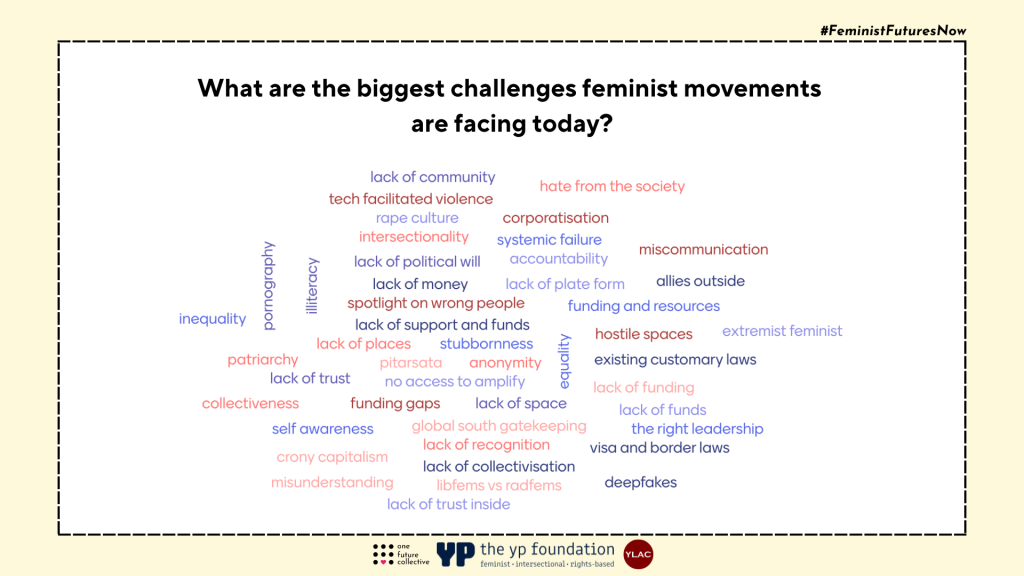
Exploring Movement-Building: Strengthening Solidarity and Sustainability
How can feminist movements not only survive but thrive amid these challenges? In this section, facilitated by Anvita Walia, we explored key movement-building frameworks, drawing from the work of Srilatha Batliwala, Deepa Iyer, and the Building Movement Project.
To ground our discussion on movement-building, we turned to feminist scholar-activist Srilatha Batliwala’s framework, which provides a critical lens on where feminist movements stand today. It helped us define movements not just as collectives of individuals advocating for change, but as interconnected communities shaped by lived experiences of injustice, who come together to build collective power, nurture leadership, and forge a shared agenda for transformation over time. Today, feminist movements, in particular, face significant challenges that threaten their integrity, autonomy, and impact. These include the co-option and distortion of feminist ideology—where mainstream institutions dilute or co-opt feminist discourse for their own ends, the resurgence of fundamentalist forces that actively push back against gender justice, and the gradual but accelerating shift of donor resources away from movement-building toward short-term, measurable interventions. The “magic bullet” syndrome—where funders and policymakers seek quick-fix solutions to deeply entrenched problems—further weakens movements, as does the NGO-isation of activism, which prioritises institutionalisation over grassroots organising. Additionally, internal fragmentation and splintering within feminist movements themselves make it harder to build shared, intersectional strategies for change. These structural and political challenges underscored the need for feminist organising that is sustainable, adaptable, and rooted in long-term, transformative goals.
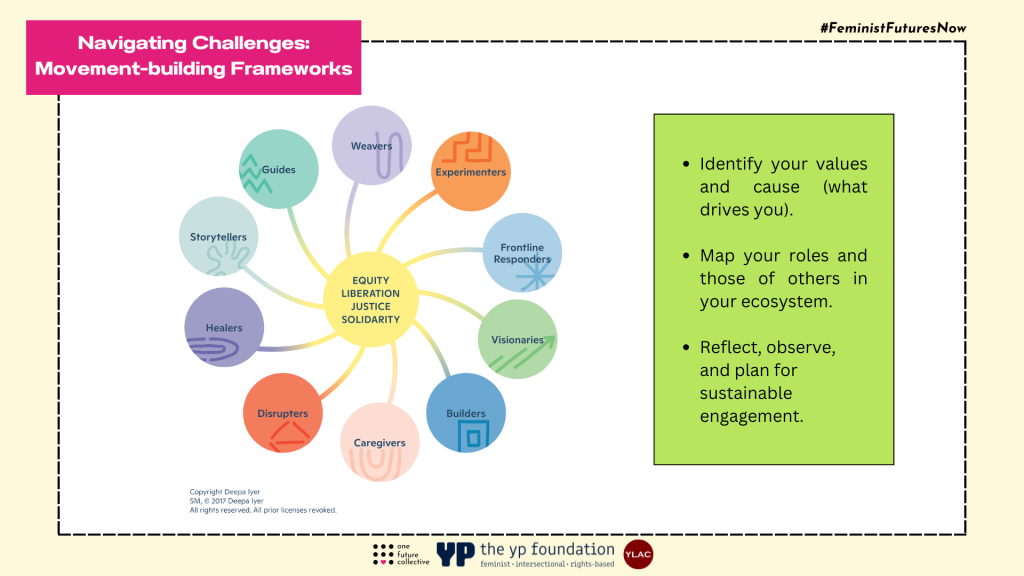
To complement this analysis, we explored Deepa Iyer’s Social Change Ecosystem Map, which offers a framework for understanding the interconnected nature of social movements. Change does not happen in isolation—movements thrive within ecosystems, where individuals, organisations, and networks play different but complementary roles. The Social Change Ecosystem Map helps us recognise that no single person or group can drive justice alone, and that effective movements require a balance of roles, from caregivers and storytellers to disruptors and builders. Importantly, these roles are not static; they shift depending on context, capacity, and need. We used this framework to encourage participants to map their own values, causes, and roles within movements, helping them reflect on their unique contributions and identify partnerships with those playing different roles. This exercise deepened our understanding of how diverse skill sets and perspectives collectively shape more sustainable and impactful movements.
Building on these insights, we then explored cross-movement approaches using the framework developed by the Building Movement Project. In an increasingly interconnected world, movements cannot afford to work in silos; solidarity across struggles is critical to building lasting change. We examined three key approaches to cross-movement collaboration: transactional, collaborative, and transformative. Transactional solidarity involves short-term, goal-oriented partnerships, while collaborative solidarity fosters deeper, long-term alliances. Transformative solidarity—though the most ambitious—seeks to fundamentally shift power structures by building sustained, intersectional movements. While transformative solidarity is the ideal, resource and capacity constraints often make it challenging, requiring movements to be strategic about when and how they engage across sectors. Through this discussion, we emphasised the necessity of cross-movement solidarity as a core pillar of feminist movement-building in today’s world.
Strategising for Action: Building Solutions from the Ground Up
With these insights in mind, we moved into smaller breakout room discussions facilitated by Shubhra Jha, where participants tackled real-world scenarios that feminist movements frequently encounter. These included:
- How do we facilitate intergenerational dialogue and collaboration, and what challenges and opportunities arise in these conversations?
- How do we navigate disagreements in a constructive way while maintaining the integrity of our movements?
- Where do we draw the line between being politically correct and creating space for meaningful learning and unlearning?
- What does it mean to lead while holding identities that are marginalised, underrepresented, or overlooked?
The group discussions yielded insightful strategies: ensuring shared goals in movement spaces, creating judgment-free environments, valuing diverse perspectives, simplifying complex ideas without diluting their meaning, and embracing moments of discomfort as opportunities for growth. Participants highlighted the importance of collective care, accountability, and the need for more inclusive leadership structures that recognise lived experience as a form of expertise.
Learning from Movement Leaders: A Conversation on Collective Power
“We are not the future. We are the present. We are here. You know, the idea that certain kind of experience equates to wisdom is quite flawed because wisdom comes from listening, from adapting, and definitely from evolving. And all generations need to recognise this about other generations that they’re planning to work with. There is no particular generation that can own activism, leadership, or any kind of decision-making. […] I think we need to step in even when the space is not made for us. And if systems are built to exclude, very kindly and gently disrupt them.”
— Don Hasar, Gender Rights Activist and Founder of Boundless
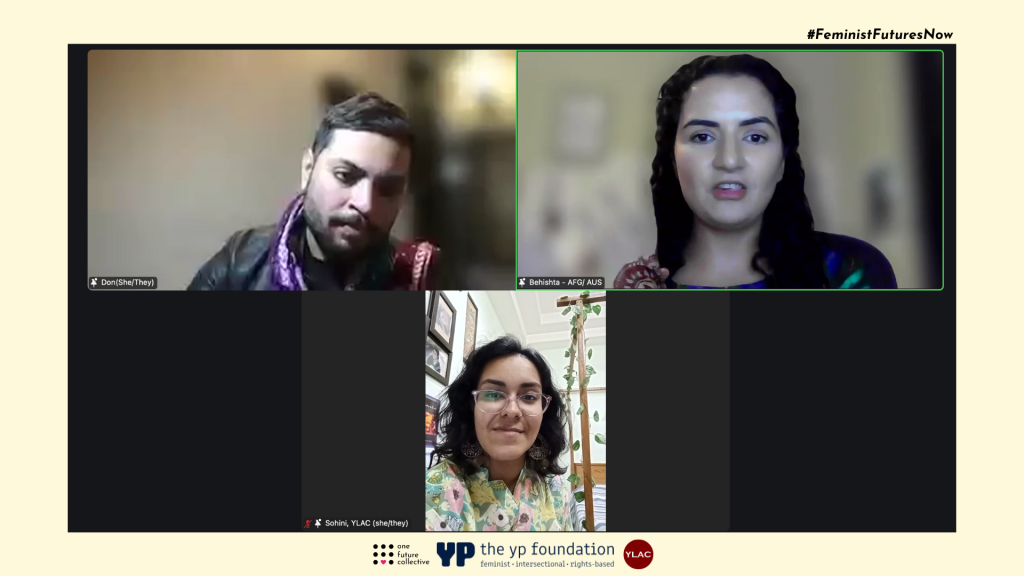
To further ground our discussions in lived experience, we hosted a compelling panel discussion featuring Don Hasar, a queer-trans rights and cultural resistance worker, and Behishta Anwar, president of the Afghan Women’s Federation of South Australia. Moderated by Sohini Chakrabarti, this conversation unpacked the complexities of movement-building, intergenerational solidarity, and strategies for sustaining activism in the face of adversity.
One of the most resonant insights from the discussion was the importance of patience and long-term commitment in movement-building. Don and Behishta emphasised that transformative change is often slow and nonlinear, requiring activists to balance urgency with sustainability. They also spoke about the emotional labor of leadership, the necessity of creating spaces where activists can rest and recover, and the role of storytelling in resisting erasure and reclaiming narratives.
“A lot of times, it’s also about bringing men into conversation. So, our father, our big brothers—bringing them into conversation and making them our allies. A lot of events that I go to, I try to take my dad with me, so he understands what’s happening there and then he can be that advocate for me or he can be that ally. […] The biggest thing is also education and, you know, finding that common ground.”
— Behishta Anwar, Human Rights Activist and Founder of Behman Collection
Reimagining Feminist Futures
As the event drew to a close, we turned our focus toward the future. We invited participants to collectively envision the kind of feminist world they are working toward. The responses reflected dreams of justice, joy, and radical inclusivity—a world where feminist movements are not just resisting oppression but actively co-creating alternative futures.
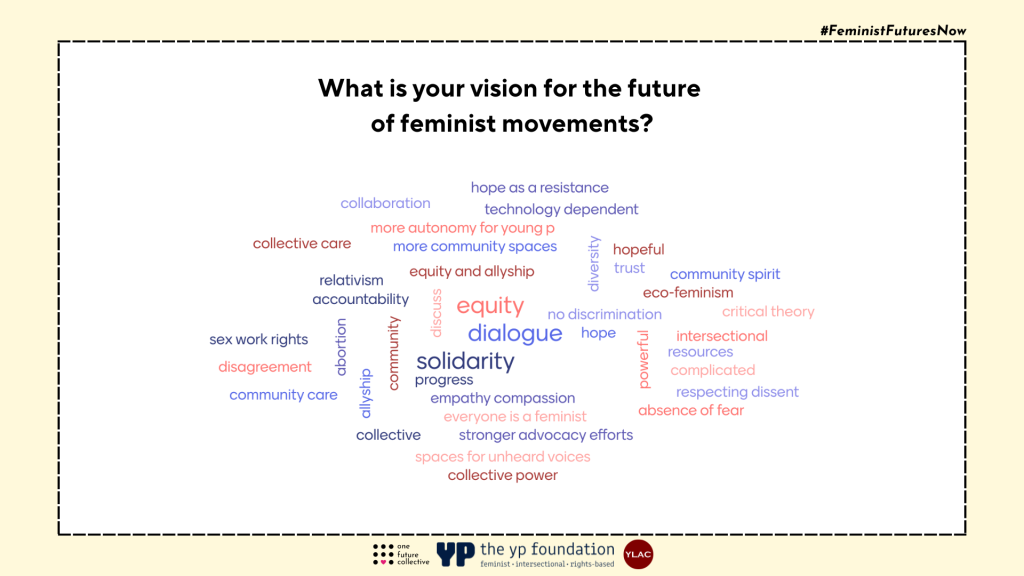
This exercise was not just aspirational; it was a call to action. The challenges facing feminist movements today are formidable, but so is our collective power. By deepening solidarity, fostering inclusive leadership, and continuously learning from each other, we can build movements that are transformative.
The conversations sparked in this session will not end here. They will continue in the choices we make, the alliances we build, and the strategies we refine. As we step forward, the question remains: How do we ensure that youth leadership is not just recognised but meaningfully included in shaping the future of feminist movements?
The work ahead is vast, but one thing is certain—our movements are strongest when we move together.
